Greetings!
Great day today as I’ve two weeks’ away from work to look forward to and for the first part I’m on my annual pilgrimage, this time a walking pilgrimage to Bardsey Island in Wales, (in Mediaeval times three trips to Bardsey = 1 trip to Rome!).
I’m really interested in how this will go since although I’ve been on plenty of pilgrimages before and to Wales countless times, I’ve never done a walking trip of several days. Oh well, never too old to try something new and I promise that I’ll post how it goes here on UTM. In the meantime though, to a very different religious place, the awe-inspiring mosques of Samarkand and the tomb of none other than the Prophet Daniel.
Keep travelling!
Uncle Travelling Matt
Links to all parts of the travelogue
Book 1: Embarking Upon A New Korea
1e: Seoul, Incheon and Across the Yellow Sea
Book 2: Master Potter does Fine China
Book 3: Steppe to the Left, Steppe to the Right…
19th August, 2002 – Samarkand, Uzbekistan
Awakening earlier than we’d have perhaps liked to, we showered and then set off on the annoying yet seemingly necessary task of acquiring OVIR permission to let us purchase a railway ticket onwards. It was a shame, since it put us in an irritable mood from the word go, which otherwise we doubtless would not have had since our hotel was pleasant, the breakfast spread more than acceptable and our dining companions, two mountain-climbing Poles, interesting. What’s more, just as we were finishing off our tea, a familiar face descended the iron staircase from the upper rooms to join us. And as you can imagine, familiar faces are not all that common in deepest darkest Uzbekistan.
“Is that an Irishman I see?” hollered I.
Brian Connellan looked up in surprise. “Good morning, gentlemen. I didn’t expect to find you here. How are things?”
He joined us and we caught up with the events of the last few days. He had been unable to join us at Almaty station as registering at his hotel had taken around two hours. If he’d have said that a week ago, I doubt that I’d have doubted the truthfulness of the statement. As it was, after a mere five days in the Stans, I had no doubt as to his integrity. We related our near miss in the underground system and the episode with the bank clerk on the railway platform.
“You were the lucky ones,” said Brian, “the police got me good and proper in Almaty.”
Apparently, he’d decided to save some money by walking back from the city centre to the railway station. This had proved to be a big mistake, since with his baggage he was a very visible target. Stopped by the police, ‘to check his visa’, they’d ordered him to turn out his wallet, which he did and was then passed amongst them, and duly handed back with a ‘Thanks for your co-operation.’ It was only when he was on the train later, that he noticed that $150 had gone missing. The episode had so distressed our friend from the Emerald Isle that he had done nothing in Tashkent but sit inside his hotel, not wishing to encounter anymore members of the constabulary. We hadn’t the heart to tell him that Tashkent had been our favourite Central Asian city so far, although perhaps with his love of all things Islamic and distaste of all things totalitarian, he’d have been less impressed.
And so it was that we set off with somewhat lighter hearts, yet still wearisome, knowing that the seemingly simple task ahead of us had numerous potential pitfalls.
Things did not start well. After impressing strongly upon the taxi driver, to which OVIR office we wanted to be taken, he proceeded to escort us to the wrong one, and when we did eventually reach the correct place, there the waiting game began. Eventually however, after an hour or so in the corridor, we saw the man that we needed, who took our details and told us that passes were now being prepared. In order to save time, I suggested that the Lowlander go on ahead to the bank and get the money on his credit card, (remember, all the banks had been shut in Bukhara), and so off he went and it was about half an hour later that I was able to join him.
I arrived at the bank to find my Dutch comrade a far from happy man. After having waited for some considerable length of time at a window with a MasterCard symbol emblazoned upon it, he had been rather rudely told that they didn’t do that aforesaid credit card. “But this is the MasterCard symbol!” he protested, pointing to the merging red and yellow globes. The woman apparently looked at him as if it say ‘It says Oxo on a bus, but it isn’t’. This was a problem. Not only did I have a fuming Netherlander on my hands, but we were also now with far less money than was comfortable, and no way of getting any extra.
“Still, at least we have the bloody OVIR passes now,” I said, trying to cheer my companion up a little, as we piled into the railway station-bound taxi.
Not wanting any of the hassles of the last journey, we ordered first class berths this time. The lady, who was thinner, prettier and altogether politer than her colleague the previous evening gave us a sum in sum which we proceeded to shell out.
“And here’s our OVIR permissions,” I added, handing over those two precious gems of Uzbeki bureaucracy.
She picked them up and gave them a derogatory glance. “These are not required anymore,” she snorted, handing those not-so-precious-after-all bits of paper back to their dismayed owners.
The episode last night, the early start, several taxi rides and an hour and a half’s wait. For what? Nothing! Grr…
But as good old Monty Python had said, ‘Always look on the bright side of life.’ That was the past and now, not only were our tickets to Urgench safely in our wallets, but we had the remainder of this sunny day ahead of us to explore the fabled city of Samarkand, and so off we went , straight to the best bit of course. “Taxi! To the Registan please.”
More than any other Silk Road city, Samarkand has left its mark on the imagination of the world. It is the setting for many of Sheherezade’s tales, the subject of a poem by James Elroy Flecker, and its name cannot be uttered without evoking exotic images of Genghis Khan or Marco Polo.
Yet good old Genghis did the city no favours. In fact in 1220, like most of the places that he visited, he flattened the place. The Samarkand of mosques and minarets, shimmering in the sand, didn’t come along until sometime later in the fourteenth century when Amir Timur, decided to make it his capital and constructed a city like no other on Earth.
Amir Timur, (or 'Tamerlane' as he is sometimes known), is a massive figure in Turkestan history. Son of a tribal chieftain, he claimed descent from Genghis Khan and started to rebuild Samarkand as his capital in 1370. Most of his time however, was spent outside of the city waging military campaigns, firstly against Persia that occupied him until 1387, then in the Caucasus (1392), against the Russians (13968) before turning his attention to India and destroying the Delhi Sultanate. Later in life he once again advanced into the Levant, capturing Baghdad and in 1402 Angora (Ankara). He died in 1404, whilst planning an invasion of China, as one of the most feared and renowned military commanders that the world has ever seen, and Samarkand was his magnificent legacy.
His city of palaces, mosques and medrassahs proclaimed the glory of Islamic culture to the world and from it much of that world, (or at least the Central Asian section of it), was ruled.
Nowadays however, not much of it is left. His empire was divided up after his death and Samarkand declined in importance, eventually becoming subordinate to the Emirate of Bukhara in 1555. The whole place fell into disrepair and was virtually abandoned and didn't start to become important again until the Russians came along and made it their capital of Turkestan, (soon transferred to Tashkent). Today's Samarkand is a strange mix; a Soviet city, far richer and pleasanter than Bukhara, dotted with monuments and ruins that are testament to the might of Timur. Individually the architecture here is the best in Uzbekistan, but unlike Bukhara or Khiva there is no ancient centre worth speaking of, and sadly, overall the whole Arabian Nights atmosphere is lacking.
One part of Timur's [not so] eternal capital that has survived largely intact is it's grand centrepiece, the Registan, the most potent symbol of Central Asia. This vast square, once crowded with market stalls, is flanked by two medrassahs and a mosque all huge and constructed in the stunning intricate blue tilework for which the city is famous. It truly is one of the Wonders of the World, and even after being a bit 'medrassahed out' after Bukhara, we were impressed. We had our photos taken by the buildings that are on the cover of every tourist brochure for miles around, and then wandered inside, marvelling at the spectacular ceilings and interiors. Despite the hassles involved in getting here, this was an amazing sight to see and unlike in Bukhara, there were no feelings of disappointment.
Problem was though, after doing the best, where the go next? We consulted the guidebook and spotting another concentration of historical sites including the highly recommended Bibi Khan Mosque, a short distance to the north, so off we went, stopping for shashlik en route. This proved to be a mistake as the fayre turned out to be neither tasty or cheap, and when I needed a toilet, I was informed that there wasn't one. Hurriedly I dived into the streets behind the restaurant and found myself in an area akin to that around Char Minar in Bukhara, with traditional houses and narrow streets; it was what was left of the old centre. Nice as that might have been though, the problem was that traditional Turkestan housing areas contain absolutely no areas in which one may relieve oneself, and I wandered around for what seemed like an age before finding a dire lavatory next to a shady square complete with drinking fountain.
Moving onwards we encountered Brian once more, this time accompanied by a sightseeing companion from Italy, (or Colombia, I'm not sure which, they're both remarkable similar places anyway I'm sure), with a long lens camera and the name of Valentino. We bid them luck on their touristic mission and then continued on ours.
I have to say, that the Bibi Khan Mosque amazed me. More than any other building that we'd seen, including those of the Registan, it staggered the senses. It was huge, yet somehow human in its scale, and altogether exquisite. Sadly, my photos did not do it justice; it was perhaps the sort of structure that never comes out well on camera anyway since I've never seen any photograph of it that does do it justice? But whatever the case may be, it is in my humble opinion, Central Asia's finest asset.
Construction on the structure commenced in 1399 whilst Timur was on a campaign in Hindustan as a monument to his much-loved (and reputedly not only by him!) wife, and it was eventually completed in 1404. It was by far the biggest of Timur's edifices and was to surpass all else that he erected, the aim being ably summed up by the Court Historian of the day, Sherefeddin Ali Yezdi who declared 'The dome would be unique were not the dome of Heaven its equal, unique would be the archway were not the Milky Way its match.'
Having done the big boys, the Lowlander and I now decided to head out of town to see some of the highlights there, of which there were many, but as far as I was concerned, two that particularly intrigued me. The first was the Observatory of Ulug Bek, a man who although often cast into shadow beneath his might grandfather, Timur, was in many respects the far greater of the two. Whereas Timur's forte was conquering and subduing, Ulug Bek was a man of learning who founded a university and achieved fame for his astronomical discoveries, most of which were made at his Observatory, which was by far the greatest on Earth at the time. All this discovery and learning however did not please everyone, and the religious authorities grew angry at his interference in the realm of God, beheading the king and after his death, razing the famous site of star-gazing to the ground, and as the years rolled by many began to wonder if it were all but a legend? But in the late twentieth century the site was rediscovered by archaeologists and excavated in 1970. Ok, so there wouldn't be a lot there barring a circular track for a telescope, (an amazing forty-eight metres in diameter), but it should be seen, if only to pay tribute to one of the few Central Asians who thought it better to study than slay.
And so we went and saw the circle, and the statue of old Ulug himself, and indeed meditated upon his greatness. We did not however, pay the fee to see the exhibition, (in Uzbeki), and so all too soon we were off to examine the second out-of-town attraction, the Tomb of Daniel.
Daniel, yes, Daniel. Remember him? Lion's den, protected by God, that's the one. Well, now he's in Samarkand, his body brought there by Timur so they say, and according to legend, his corpse gets longer by an inch or so each year, and so what we saw was no average tomb of a prophet, but instead a very long one indeed, eighteen metres long in fact. Thanks be to God!
And so we did the tourist stuff, or at least all that we could cope with for the time being, and so when we returned to the city, we went not to another mosque, museum or medrassah, but instead to a cafe by the Registan for what else, but tea and backgammon. Despite being in front of that famous square though, this cafe was obviously not on the regular tourist circuit, as tea here cost only fifty sum instead of the regular two hundred. We played our game and attracted the attentions of the local kids who crowded around before being shooed away by the proprietor. We were more interested however, in the game that the locals were playing, on a backgammon board but with completely different rules, whereby the aim seemed to be to leave as many single pieces on a spot as possible, as opposed to our rules whereby one tries to protect one's pieces by leaving two or more on a place.
Once the tea was drunk, we hailed a taxi to the telephone exchange in the Soviet heart of the city. The reason for this was simple; we'd changed all our ready cash and it was fast becoming clear that Uzbekistan did not accept MasterCard. Yet that was all that we had, and our remaining sum was inadequate to get us a ticket to Moscow. What were we to do? Like ET. we'd phone home.
But alas, like so many other things in Uzbekistan, phoning home is not perhaps as simple as it should be. The telephone office used an extremely antiquated system, (which according to an unimpressed Lowlander, was put to shame by that used in Sub-Saharan Africa), whereby one had to write the number down that one was going to call, and specify the amount of time that the call would last, and then let Madame Operator do the dialling. And so we scribed the number of Huis van den Ouden Nederland, and asked for three minutes, and lo, it rang and even greater lo, someone answered. And thus the Lowlander spoke in his Lowland tongue for exactly three minutes before being cut off mid-sentence, and coming out of the cubicle looking grave. “It was my mother,” said he, “and she is not so good as my father for things like this. The connection was bad and then I got cut off. I don't think that she really understood what I was trying to say and I suspect that the same would happen if we tried a second time. What should we do?”
I thought for a moment before asking if he still had the email addresses of his friend and girlfriend that I'd emailed on his behalf whilst in China. Yes, he had, and so we popped into the internet cafe next door and I typed a message that he dictated, (I'm a faster typer), and sent it on to his charming young lady whom we hoped would pass it on to those with the dosh.
And that was all that we could do, and so we went to the park, dined on some of the by now very familiar shashlik, before walking back to the Registan via the Timur statue and Rukhabad Mausoleum (1380). It was now dark and although we had several hours until our train was to depart we fancied not walking the streets of Samarkand at night, so we returned to the hotel, collected our bags and took a taxi to the now deserted railway station; a huge Soviet affair with murals evoking the Timurian heritage of the city that it served. And thus we retired to the equally empty station bar, and I embarked upon a new book, (Bridget Jones: The Edge of Reason by Helen Fielding, something light for a change), and read, letting the hours slip peacefully by with only a barman and Dutchman for company.
But then, at around half eight, the door opened and someone walked in. Followed by someone else. And someone else, and someone else and... And within two minutes the place was heaving. What the hell was happening? We were mystified as these were not passengers but staff. What looked like the entire staff of the station in fact!
The answer soon came. The barman got up off his seat and switched on the tiny black and white TV set behind the counter. Sickly music started up, and pictures of rich and beautiful Latin Americans flashed across the screen accompanied by the word 'Esmerelda'. It was the nightly soap.
Esmerelda turned out to show the trials and tribulations of the wealthy and glamourous who resided at the Esmerelda Ranch in Mexico. Maria was seeing Fernando behind the back of Carlos whilst Anna Rosa was expecting a baby that wasn't Manuel's. Question was, who's was it? Unfortunately, the closing credits started to roll before we knew the answer and by the time that the adverts came on, the cafe was deserted once more.
I was stunned. Never before have I seen mass devotion to a soap like that. And it wasn't even a very good one too. In fact, it was almost the worst that I've ever witnessed, only my misfortune of having sat through several episodes of The Bold and the Beautiful denying it top spot. The Lowlander and I looked at each other in amazement. This was one weird country indeed!
Our train arrived on time and we dived in, eager to shut ourselves in our private compartment and go to sleep soundly for the night. That however, was not to be our lot.
“You are in here,” said the attendant.
“I think not,” said I. “This ticket is for First Class, two people per compartment. There are already two occupants here.” I pointed at a pair of portly Uzbekis who were occupying half our compartment.
“No, no, this ticket is Second Class. In here!”
“But we asked for First Class, and [more importantly] paid for it!”
“Maybe so, maybe not. But this is a Second Class ticket.”
“But we demand First Class. That is what we paid for!”
“There is no First Class on this train, all coaches are Second Class.”
He was telling the truth, and we had been had. Of course how exactly is a mystery. The ticket definitely was First Class as I could read that much, and yet it was also for this particular, half-occupied compartment. I understood that much too. What I suspect had happened is, (like on the Almaty – Shumkent train), there'd been a shortage of First Class rolling stock, so they'd stuck a Second Class one on instead, intending only to use two of the beds in each compartment. But that was reckoning without the crooked coach commandants of course, and whether he'd doubled the capacity of our compartment to free another up for himself, or whether he was just selling off the spare bunks for personal profit, I know or care not. The fact was that we'd been diddled yet again, and instead of a nice cabin all to ourselves, we'd be sharing with a pair of rotund locals who'd obviously been drinking and snored extremely loudly.
All for First Class price.
Oh, the romance of travel!
Next part: 3g: Samarkand to Urgench

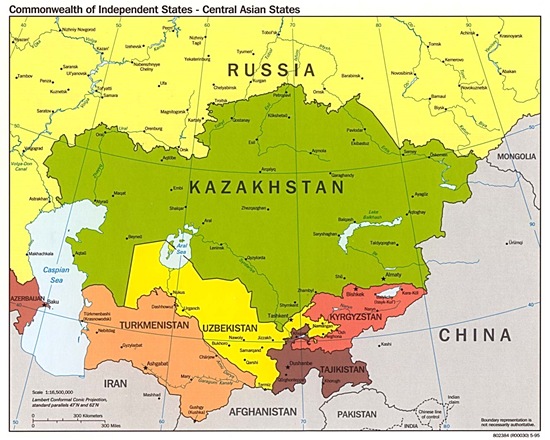
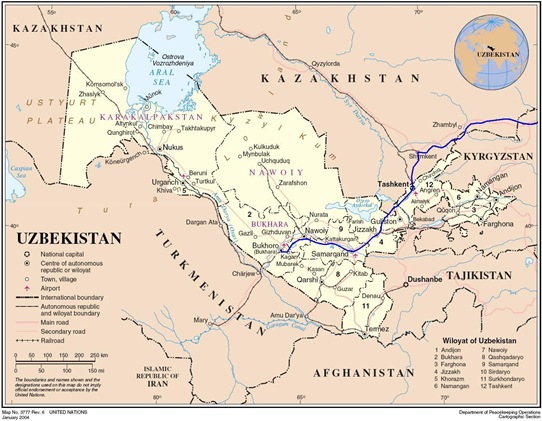
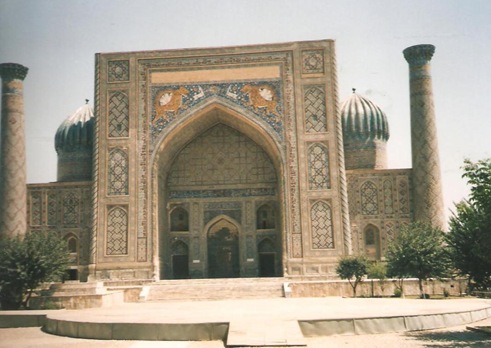


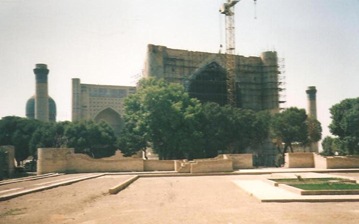
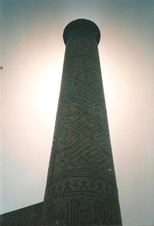
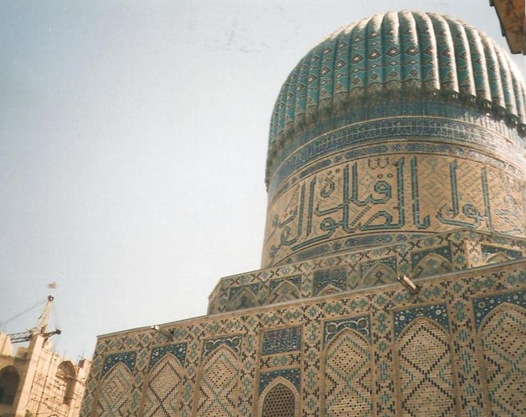
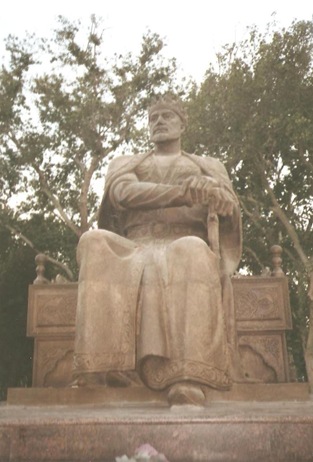
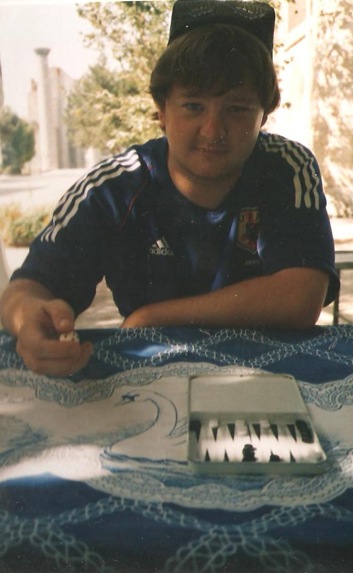
travel to samarkand
ReplyDeletehttp://www.eastroute.com/